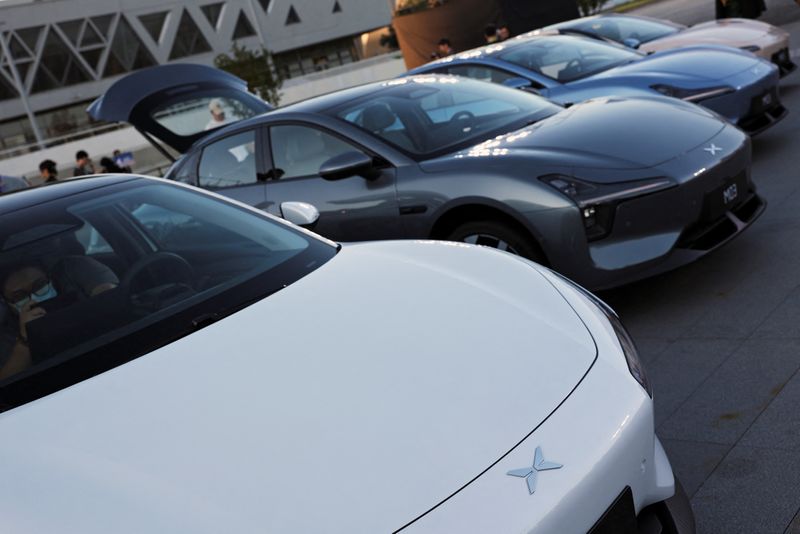
- All Instrument Types
- Indices
- Equities
- ETFs
- Funds
- Commodities
- Currencies
- Crypto
- Bonds
- Certificates
Please try another search

China's Xpeng says no impact from US curbs on its Turing AI chip output
 © Reuters. FILE PHOTO: Visitors look at MONA M03 electric vehicles (EV), displayed outside the venue of XPeng's launch event, in Beijing, China August 27, 2024. REUTERS/Florence Lo/File Photo
© Reuters. FILE PHOTO: Visitors look at MONA M03 electric vehicles (EV), displayed outside the venue of XPeng's launch event, in Beijing, China August 27, 2024. REUTERS/Florence Lo/File Photo
(Reuters) -Chinese electric vehicle maker Xpeng (NYSE:XPEV) said mass production of its Turing self-designed artificial intelligence chip was progressing well, dismissing concerns it could be hit by new U.S. curbs on advanced semiconductors for Chinese firms.
The U.S. Department of Commerce ordered Taiwan Semiconductor Manufacturing Co to halt shipments of advanced chips to Chinese customers earlier in November for AI applications, Reuters reported.
Asked by an analyst on a post-earnings call on Tuesday whether Xpeng’s autonomous driving chips could be affected by this, Vice President Charles Zhang said they had not seen any impact. "The mass production of our Turing SOC is still progressing well and we haven't seen any impact on our development of the Turing SOC,” Zhang said, referring to system-on-chip.
Xpeng unveiled the Turing AI chip on Nov. 6 and proclaimed a high-power performance that can support its advanced assisted driving system with large AI models similar to Tesla Inc (NASDAQ:TSLA)'s Full-Self Driving.
Xpeng's peers such as Nio, BYD and Xiaomi (HK:1810) have also been developing their self-designed chips for autonomous driving cars as they race to take on Tesla ahead of the roll-out of FSD in China, which is expected in the first quarter of 2025.
Xpeng expects fourth quarter revenue between 15.3 billion yuan and 16.2 billion yuan ($2.11 billion-$2.24 billion), compared with analysts' average estimate of 14.77 billion yuan, according to data compiled by LSEG.
It is seeing a steady demand for its MONA M03 mid-sized sedan, having delivered more than 10,000 units for the second straight month in October. Xpeng expects to deliver between 87,000 and 91,000 vehicles in the fourth quarter, up 44.6% to 51.3% from a year ago.
The Chinese automaker also said it would launch four new models in 2025, including an extended range hybrid, the first of such cars for Xpeng.
The company sold 15% of its total EVs outside China in the third quarter and expected the pace to continue next year.
Revenue for the third quarter ended Sept. 30 was 10.10 billion yuan, beating estimates of 9.77 billion yuan.
Xpeng's shares in Hong Kong fell 1.44% on Wednesday, and have lost 9.7% so far this year.
($1 = 7.2419 Chinese yuan renminbi)
Related Articles
Are you sure you want to block %USER_NAME%?
By doing so, you and %USER_NAME% will not be able to see any of each other's Investing.com's posts.
%USER_NAME% was successfully added to your Block List
Since you’ve just unblocked this person, you must wait 48 hours before renewing the block.
I feel that this comment is:
Thank You!
Your report has been sent to our moderators for review





Add a Comment
We encourage you to use comments to engage with users, share your perspective and ask questions of authors and each other. However, in order to maintain the high level of discourse we’ve all come to value and expect, please keep the following criteria in mind:
Perpetrators of spam or abuse will be deleted from the site and prohibited from future registration at Investing.com’s discretion.